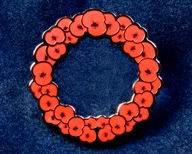|
-
10th July 12, 07:19 AM
#1
When Hull (East coast of Yorkshire) burned there was a call for anyone able to go and help fight the fires.
In York they could see the glow in the sky at night and the smoke by day, and smell it all the time.
My uncle Stan went - then after three days they found out he should be at school and sent him home. My mother remembered him ariving with all his clothes scorched and no hair at the front of his head, nor any eyebrows where he'd been singed by the flames.
Anne the Pleater :ootd:
-
-

in memory strong.
-
-
16th August 12, 02:18 PM
#3
-
-
20th August 12, 11:16 AM
#4
Both of my wife’s grandfathers took part in the Battle of the Somme.
Her maternal grandfather entered Delville Wood at Longueval with the South African Scottish, and was one of a handful of men who walked out.
General Tim Lukin cried as he inspected the survivors.
Her paternal grandfather was next to enter the wood, with the Royal Welch Fusiliers. (He had joined the Lancashire Fusiliers, but was one of a group transferred to the Welsh regiment because they were so short.)
He walked out of the wood carrying a Lewis gun. When it was taken from him, he collapsed.
Recommended for the VC, he received the Military Medal, as well as an illuminated address from his hometown, Salford (now in Greater Manchester).
My maternal grandfather was a medical orderly in East Africa.
My paternal grandfather came from a family that had left Germany, as his father was wont to put it, so that “my sons would not be conscripted to fight for the German Reich”.
Although they were of a pacifist inclination, one of my grandfather’s brothers did join up.
In the Second World War, my father and his younger brother both joined up.
We were blessed not to lose any lives to either war, but after my father was shot (by a heavy-calibre artillery piece) his mother received a telegram informing her that he was “gravely wounded, not expected to live”.
Regards,
Mike
The fear of the Lord is a fountain of life.
[Proverbs 14:27]
-
-
21st August 12, 04:38 AM
#5
My grandfather fought there and (fortunately for him, and me) survived... I remember several of his "war stories" and for me WWI is not all that distant a thing.
He came home with a glass eye and numerous scars and quite a bit of shrapnel. From time to time one of those tiny bits of metal would work its way to the surface.
West Virginia has always had a higher proportion of its men serving in the military than most places in the US, and there's a War Memorial at the Capitol in Charleston honouring the people killed in various wars. There are a large number of names for such a small state. My uncle is on the WWII section. I think of him often.
Last edited by OC Richard; 21st August 12 at 04:43 AM.
Proud Mountaineer from the Highlands of West Virginia; son of the Revolution and Civil War; first Europeans on the Guyandotte
-
-
God grant us the day that we shall see no more fighting! "Lest we forget".
-
-
Yes, Canada Day is also a sombre occasion in Newfoundland. It was always moving to see the memorials of that day and go onto the Canada Day celebrations.
http://www.timeanddate.com/holidays/canada/memorial-day
--Always toward absent lovers love's tide stronger flows.
-
-
15th August 12, 03:47 AM
#8
"When You Go Home, Tell Them Of Us And Say,
For Their Tomorrow, We Gave Our Today"
(John Maxwell Edmonds 1875-1958)
-
-
15th August 12, 06:07 AM
#9
 Originally Posted by Peter Crowe

"When You Go Home, Tell Them Of Us And Say,
For Their Tomorrow, We Gave Our Today"
(John Maxwell Edmonds 1875-1958)
Simple, evocative, and to the point. Very well said John Maxwell Edmonds.
-
-
15th August 12, 06:47 AM
#10
 Originally Posted by Peter Crowe

"When You Go Home, Tell Them Of Us And Say,
For Their Tomorrow, We Gave Our Today"
(John Maxwell Edmonds 1875-1958)
This is often called the Kohima Epitaph because it is written on the memorial which commemorates the British and Indian war dead at the famous World War II battles of Kohima and Imphal where the Japanese advance was halted and turned around at very high cost. It also has strong support from the Burma Star Association. However, I believe it predates the 1939-45 war and was published among other epitaphs for the war dead in 1916. It is the epitaph for our fallen that always left me with a lump in my larynx even as a young boy. Edmonds was a classics scholar and wrote it about the Spartans who fought to the last at the Battle of Thermopylae in 480 BC.
Last edited by Peter Crowe; 15th August 12 at 07:11 AM.
-
 Posting Permissions
Posting Permissions
- You may not post new threads
- You may not post replies
- You may not post attachments
- You may not edit your posts
-
Forum Rules
|
|
























Bookmarks